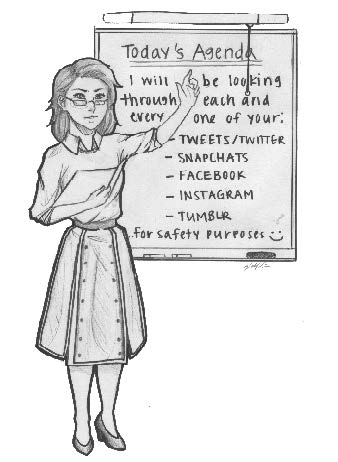Schools Must Value Safety Over Privacy

Social media broadcasts one’s life, yet when schools began to use these public platforms to monitor potential threats to schools in Florida and Alabama, both students and parents became outraged. Students became upset that computer programs employed by high schools could look through their public accounts to obtain information. Imagine someone choosing to only wear clothes made of saran wrap, and then complaining that everyone can look at them. Similarly, it makes no sense for so many people to be in an uproar that others can view their public social media profiles when they choose to broadcast their life on social media. Privacy is a fundamental right guaranteed by the Fourth Amendment in the U.S. Constitution. People think that what they post is only their business even though one could argue that the purpose of social media is to be social and receive some form of attention from others. However, when dangers such as bullying, drug use, violence, and suicide are also apparent on social media, it is necessary for schools to be cognizant of these dangers.
Several high schools across the country are using programs that monitor students’ social media accounts. To many, this brings both discomfort and criticism. Students demand their rights to privacy and call these programs “unfair.” Their parents are even more angered. They believe that their children should be free to say anything without being watched by the school.
Their concerns are understandable. Nobody is necessarily ecstatic about schools looking through their personal life. However, upon further consideration, it is difficult to ignore the reasonable intentions behind monitoring social media. First, social media is not private. Second, programs are used in order to protect students, not exploit them. Schools in Orange County, Florida, and Glendale use a program called “Snaptrends,” which monitors key words from all social media platforms that could possibly present threats to students or staff, such as ‘gun,’ ‘attack,’ or ‘kill.’ In the program’s privacy policy, the technology only looks through public posts. When a student tweets “I hate my math teacher,” they have to consider that if they are not using a private account, any person can view this, without needing any type of program. Teachers could be viewing their students’ brutally honest tweets right now without needing the use of the school’s computer program. Additionally, schools have no interest in inspecting hundreds of student’s personal lives, their opinions on their teachers, or even the enormous amount of homework they receive. The programs are not meant to invade student’s personal lives but to protect them.
The unfortunate reality is that programs like these are sometimes necessary to prevent or combat real life threatening situations. Schools are doing everything in their power to protect students and prevent school violence. According to CNN, the Huntsville City School District received a tip from a post on social media containing a threat to a teacher. The student who had posted the threat was later found on campus with a knife with an eight-inch blade. Those who mention the Fourth Amendment and their right to privacy must also consider the fact that programs like these are not unconstitutional. The Fourth Amendment protects people against unreasonable search and seizure without a warrant or probable cause. Schools in Huntsville, Alabama use a program called Students Against Fear (SAFe), which uses tips from students, staff members, and parents to identify potential threats to students and then conducts further investigation about the student’s public social media activity.
Before the program had started in Florida, a 12-year-old named Rebecca Sedwick committed suicide in Sept. 2013. It was later discovered that two teenage girls had been stalking and harassing Sedwick online by sending messages such as “Why aren’t you dead?” and “Wait a minute, why are you still alive?”. The school was aware of the bullying occurring on campus but did not know the extent of its aggressiveness and persistence online. If the school had adopted a social media-monitoring program, then they could have brought the cyberbullying to light early and addressed the issue before it was too late.
School officials are not concerned with judging students’ personal lives. Their goal is to find potential dangers, such as cyber-bullying, suicide, drug use, and crime. Schools have the responsibility to protect students. The aforementioned potential dangers not only greatly affect the students’ academic performance but can also endanger their lives. In order to address these problems, schools need to adopt programs that monitor students’ social media accounts in order to ensure their safety.
Hello there! Our goal is to provide relavent, engaging journalism for readers of all ages. Your donation will support the student journalists of the Wolfpacket at Claremont High School, and will allow us to purchase equipment, print our monthly issues, and enter in journalism competitions. We appreciate your consideration!




